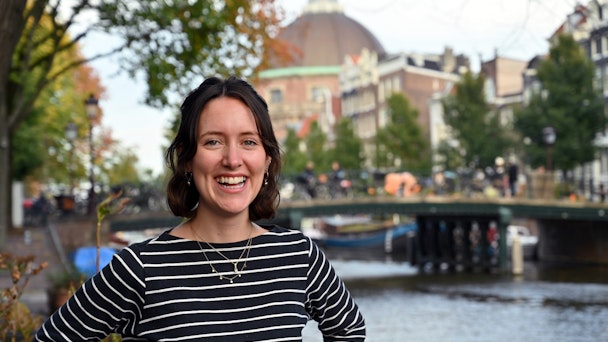The Social for Good series invites marketers from agencies, brands, organizations, and NGOs that have a clear mission to improve the world we live in. Hey Honey’s goal is to encourage readers to be more aware and change their behavior so that they may improve the lives of others and of their own through smarter social-first creative, communications, and community engagement. Meet Imogen Henry, Marketing Manager at WaterBear.

In the first of our Social for Good series, we introduce WaterBear, home of captivating films and thought-provoking series that empower you to lead a meaningful life. Hey Honey is proud to work with WaterBear to grow their social media following, create inspiring content and increase engagement. We invited Imogen Henry, Marketing Manager at WaterBear to speak about how their organisation drive positive change through social media and asked the question “How does WaterBear drive positive change through social media?”
Social media driving awareness of climate change.
The role social media is playing in the climate movement is undeniable and as a social-first company, we strive to utilise the variety of platforms to the best of our ability to help create a positive impact. We do this by telling the stories that need to be heard with the hope of inspiring people to get involved, join the conversation and learn more about the changing world around them.
We’re big believers in progress, not perfection.
In striving for perfection, there’s a risk of being set up to fail, instead, we can learn together and take small steps of progress that lead to incremental change. There’s no such thing as an impact that’s too small and at WaterBear we’re aiming to start a movement of people, regardless of where they are on their environmental journey.
In today’s world, there’s a lot of overwhelming, anxiety-inducing social content that often does more harm than good by creating the feeling of “This is all getting too much, I’ve got to unfollow this account…”. We refer to this stance as twilight knowing, which is the mind’s resistance to engaging with what we know but pretend not to see. This is why we want to make our social channels the ‘go-to’ place for people to find positive solutions to the issues facing our changing world and make people feel empowered and inspired rather than depressed and disengaged.
Successful social change hinges on breaking the current ‘eco’ echo chamber and welcoming everyone into our community rather than just speaking to the already conscious ‘ecowarriors’. From the football fanatics to the fashionistas & foodies, there isn’t anyone we shouldn’t be speaking to. Socio-environmental issues, which are currently spoken about in silos and leveraged by many corporations in greenwashing campaigns, shouldn’t be spoken about in isolation, but rather as lenses we can use to look at every part of our lives.
Taking football, for example, there are an estimated three and a half billion football fans around the world and by talking to this audience using the theme of football, but through a climate lens, we have huge potential for global impact. For example, when releasing a film earlier this year about the intersection between football and climate, we were able to tap into premier league football fans via our social channels, due to collaboration with clubs and players.
A collaborative approach.
Creating content is an ever-evolving collaborative process for us, from the research we include, to the messaging and style of posts. Due to our growing community and the speed at which the social sphere develops, we need to be agile and constantly test out new formats to see what lands and pivot when needed. From scrolling through our Instagram feed, it’s clear we’ve tested a lot out over the past few years and with the ever-changing Instagram algorithm, we’re always ready to keep trying new formats.
As a team, we put a lot of time and resources into what we’re posting and a big part of this is working with experts in the relevant fields to ensure we’ve got robust sources, especially as we’re living through the age of fake news and ulterior motives. We also must be quick to read, discuss and evaluate the latest stories as well as the theory which frames them to decide where we stand on the matters at hand and how best we communicate them.
When carrying out research, writing copy & designing posts, we can’t ignore the unconscious bias that we bring to the table and the negative impact this could have when ignored. In 2022, people are spending nearly three hours on social media every day (source) and new research has found that that the human brain is able to process images in just 13 milliseconds, compared to the 100 milliseconds suggested by previous studies (source). This means people are consuming social content like never before and this is unconsciously shaping our viewpoint. There’s no clear way of overcoming this, but we can make an effort to acknowledge any generalisations we make and question the views we have. This is why it’s important we work with a diverse team of people from a variety of backgrounds, nationalities and past experiences.
Building trust.
As well as reaching new audiences, we also focus on interacting with as many of our followers as possible. Focusing on engagement helps to build trust and shows that we too are on the journey and learning together. In a survey last year (source), 10,000 young people in 10 countries were asked how they felt about climate change and their respective government’s response and nearly 60 per cent said they felt very worried or extremely worried. To help alleviate the recently termed eco-anxiety, we’re creating a space where people can express their feelings, connect with others and feel empowered to take action on the topics they resonate with in our ever-changing world.
We’ve recently seen a shift away from top-down conversations on climate issues to using social media as a fast, dynamic & democratic tool to talk about issues happening in real-time. For the first time, this gives space to voices often excluded by mainstream media outlets to speak freely about their lived experience. We can then encourage this movement via our social channels by creating this safe online community.
Hopefully, we demonstrate how social media can be used for good by using it to create a ripple effect of impact around the world, follow us @waterbearnetwork if you want to join us on this journey!
Let’s continue to aim for progress, not perfection.


